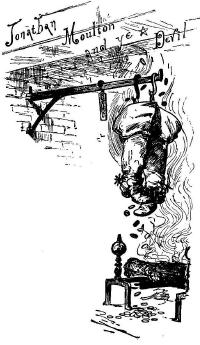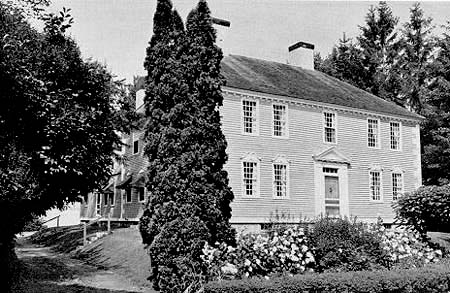| The Devil With Jonathan Moulton |

TALES OF HAMPTON
Take a lesson. Gen. Jonathan Moulton was a Revolutionary War hero. But he flaunted his wealth in the poor Puritan town of Hampton, NH. He made too many locals angry when he curried favor with the British and married a second young wife. Townspeople said he was in league with the devil – and the story stuck.
SEE: The Moulton House
READ ALSO: The Stone Throwing Devil
 Have you heard the story of poor Jonathan Moulton? Resourceful and ambitious, Moulton became the wealthiest man in Hampton, some say in the whole state of New Hampshire. No man could get so rich so fast, the townsfolk whispered, unless he had made a deal with the evil. That’s how people talk when a man builds a grand mansion in a poor Puritan town. When Moulton’s house burned down suddenly in 1769, legend claimed, the devil had taken revenge on Moulton. When Gen. John Moulton (1726-1787) rebuilt the mansion and, at 50, married the 36-year old friend of his recently dead wife – tongues truly began to wag. Moulton’s first wife had born him 11 children, they complained, and now he was flaunting his trophy bride. When the General finally died at 61 his body disappeared from the coffin. The devil, people agreed, had spirited him away.
Have you heard the story of poor Jonathan Moulton? Resourceful and ambitious, Moulton became the wealthiest man in Hampton, some say in the whole state of New Hampshire. No man could get so rich so fast, the townsfolk whispered, unless he had made a deal with the evil. That’s how people talk when a man builds a grand mansion in a poor Puritan town. When Moulton’s house burned down suddenly in 1769, legend claimed, the devil had taken revenge on Moulton. When Gen. John Moulton (1726-1787) rebuilt the mansion and, at 50, married the 36-year old friend of his recently dead wife – tongues truly began to wag. Moulton’s first wife had born him 11 children, they complained, and now he was flaunting his trophy bride. When the General finally died at 61 his body disappeared from the coffin. The devil, people agreed, had spirited him away.
A century later our friend John Greenleaf Whittier picked up the Hampton story. Fascinated by New Hampshire and by the trendy study of spiritualism, Whittier often combined Hampton and the supernatural in his wildly popular ballads. A century after Moulton's death, the poet published "The New Wife and the Old". In the poem Moulton's second wife Sarah Emery wakes on her wedding night to discover the ghost of her former friend Abigail Moulton who had died less than a year before of smallpox. In the poem, Abigail returns to the marriage bed to reclaim her wedding ring which the penurious Mr. Moulton had recycled to his second wife.
It’s a powerful image. A glowing white wife, clatters up the mansion stairs, to reclaim her jewelry after 28 years of marriage. She peels the ring off her best friend's hand while Moulton snores nearby. Then the old wife disappears under the marriage bed filling the new wife with shock and awe.
Equally powerful is the often-told Hampton legend of Moulton and the devil. According to the story, the wealthy Hampton land-owner agrees to give up his soul if Beelzebub will fill the man’s boots with gold doubloons each month. Always the businessman, the fictional Moulton has larger and larger boots custom-made, which he hangs just inside the fireplace. Each month he finds them brimful of gold which the devil has deposited down the chimney. Obsessed with greed, Moulton tricks the devil further by cutting holes in the toes of the boots. The devil, sticking to his bargain, tries to fill them just the same. The coins pour out the bottom of the boots, filling Moulton’s kitchen so deep with gold that the door cannot be opened. It is only when the devil discovers he has been duped that he sets fire to the Moulton home. In reality, Moulton, his family and guests, barely escape the blaze.
The legends serve both literary and social functions. They are macabre and leveling, allowing those citizens who Moulton outstripped to explain away his success. They restore balance. Men who gain too much wealth, love and power will certainly be brought low because cheaters never prosper. This image of justice as a rotating "wheel of fortune", prevalent in Medieval literature, is at the heart of many of Shakespeare’s plays that followed in the Elizabethan era. The Puritans had a powerful sense of justice, a justice often harsh and meted out by men in the name of God. Hampton, a town formed by Puritan settlers, held strongly to the believe that anyone who rocked the boat, was risking an eternity in Hell.
CONTINUE Legends of Jonathan Moulton
HAMPTON'S LEGENDARY GENERAL (continued)

Indeed Jonathan Moulton has been so completely consumed by tabloid folklore that it's hard to imagine him outside the context of a Halloween campfire tale. His second house, restored at the turn of the century and privately owned, still stands in Hampton. The Moulton legends were so strong after his death, that the next owner had the building officially exorcised by clergymen. It stood abandoned through much of the 19th century and was known to locals as "the haunted house."
The historical Jonathan Moulton, for the record, seems more heroic than devilish. He was descended directly from the colonial settlers of Hampton. He spent his entire childhood as an indentured worker, and purchased his own freedom. The flesh and blood Moulton marched hundreds of miles to fight with Yankee forces in the siege on Louisbourg, Nova Scotia in 1745 and fought at Saratoga. Like wealthy John Langdon of Portsmouth, Moulton organized the raid of Fort William and Mary, served on the Committee of Safety, at the Continental Congress and held office consistently in state government. Moulton owned mills, a store and lots and lots of land. When George Washington visited the Seacoast two years after Moulton's death, according to Hampton legend, the President made a point of stopping to see the house of his former general. Moulton was one of the country's first big real estate speculators, turning ten's of thousands of acres of Lake Region land into New Hampshire towns in what is today the Moultonborough area.
Why this Revolutionary War hero should be singled out for public disgrace remains a mystery, but we can tease out a few likely reasons. Moulton apparently reached too far when he and a business partner negotiated salvage rights to a beached British ship that was loaded with salable goods. Whether they paid off the pilot who wrecked the vessel is unknown. (When he returned to England two decades later, the ship captain was reportedly drawn and quartered.) Poor Hampton citizens apparently rushed to claim items from the wrecked ship, but Moulton rigidly enforced his right to keep all the booty. This act apparently alienated locals who were forced to give up what they had taken from the wrecked ship. Angry Hampton citizens are dangerous as the elderly Goody Cole found out a century earlier when she was declared a witch, then jailed and stoned to death by locals. Moulton was also highly litigious and never missed a chance to sue for money he believed was due him. That ticked people off too. The lesson? Be careful who you step on as you climb the ladder of wealth and political success.
The second lesson of Moulton’s demise offers a warning to future millionaires and leaders -- don't suck up to the wrong people. With the American Revolution in the wind, most locals were not terribly fond of wealthy British Governor Benning Wentworth of Portsmouth. Moulton, however, curried his royal favor, naming his fifth son Benning. In another grand gesture, Moulton marched his fattest ox all the way to Portsmouth as a gift to the governor. The 1,400-pound beast, draped in flowers, led by slaves and wearing a flag between his horns could not have been missed by the jealous locals. In return Moulton got an additional 18,000 acres of land near Moultonborough. A recent granite memorial was erected to Moulton at Hampton's Pine grove Cemetery, but his remains remain missing.
Thirdly, don't flaunt it. Moulton's Hampton mansion was the most amazing house in town. It was reportedly the first of its kind in the region decorated with costly white paint, imported from Britain. Amazingly, after toadying up to the English royal governor, Moulton managed to become a dyed-in-the-wool revolutionary. He was among the first to sign a patriotic loyalty oath and fought with distinction in the American Revolution. Yet he is the only high-ranking NH war hero of that era whose grave site remains unknown. It is assumed he was buried near his first wife Abigail, in a field that was later plowed up by farmers and covered with a railroad track.
A final lesson -- honor the dead. When Abigail Moulton died of smallpox after nursing local victims of the disease, she was buried not far from the mansion. Legend says her husband neglected to raise a tombstone in her honor, and turned her considerable jewelry collection over to his second wife. Although Moulton was just 14 years older than Sarah, poet Whittier exaggerated her youth and his age in the famous poem. Considering that Gov. Benning Wentworth was 40 years older than his second wife, Moulton’s indiscretion seems forgivable – but not for the good folks of Hampton.
The Yankee message, drawn from its medieval English heritage, is inevitably the same. Life, like the seasons, should be an exercise in balance. Don't get too cocky, too happy, too rich, too lucky. If you do, the neighbors will gossip, the poets will write and the historians will get the facts wrong. Then the townsfolk will bury you without even a tombstone -- and the devil will have his due.
Copyright © 2006 by J. Dennis Robinson. All rights reserved.
OUTSIDE LINK:
Much more on Jonathan Moulton of Hampton
